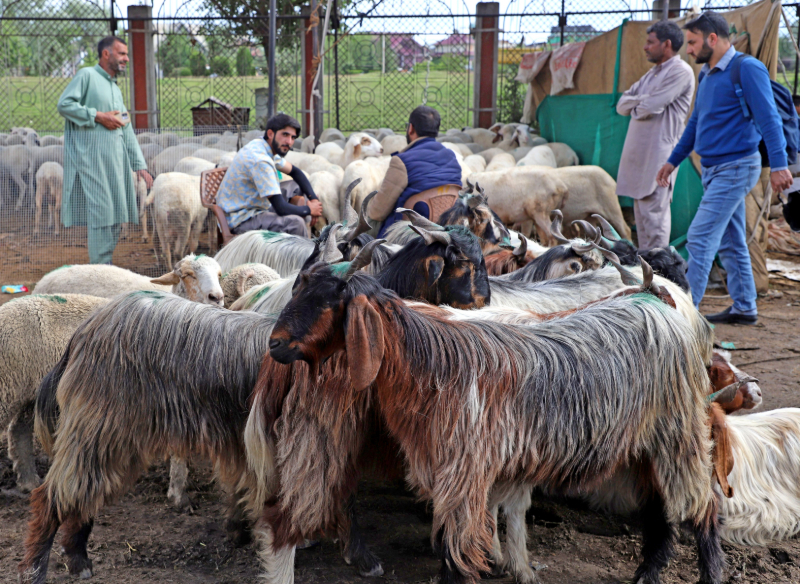SRINAGAR, JUNE 06: To add to the varieties of sacrificial animals for Eid-ul-Adha, goatherds and livestock dealers from states like Rajasthan and Gujarat are camping in Kashmir ahead of Eid-ul-Adha, bringing with them prized sheep breeds rarely seen in the valley.
The development marks a shift in the region’s livestock trade dynamics, where until now, local dealers would typically import animals from other states themselves.
With Eid-ul-Adha just around the corner, Kashmir’s livestock markets are bustling with activity as non-local goatherds from Rajasthan, Gujarat, and other parts of India arrive with a wide range of elite sheep breeds. From Srinagar’s Khayam to the markets of Anantnag and Baramulla, goatherds have set up makeshift camps, showcasing unique and prized breeds such as Chokla, Marwari, Magra, and Nali from Rajasthan, along with Patanwadi sheep from Gujarat. These high-quality animals are attracting keen interest from locals looking for superior choices for sacrifice this Eid. “We used to sell only to dealers here, and the options were limited. Now we have brought in varieties like Pugal, Nali, and Kajuwala sheep, which are in high demand in the rest of India. We are confident Kashmiris will appreciate their quality,” ,” said Shakeel Ahmad, a goatherd from Rajasthan.
Pertinently new sheep breeds have been making their way to Kashmir during Eid season particularly Marwari to Kajuwala, Seekhar and Nawalgarhi. The influx of these premium breeds, many of which are prized for their size, wool, and overall appearance, has added a new dimension to Kashmir’s traditional Eid markets. The availability of non-local options is giving buyers more choices and, in many cases, better value for money. According to mutton traders, both the quality and quantity of livestock available this year have significantly improved. “There’s a lot of variety in the market this Eid. People are comparing breeds, sizes, and health conditions before making a purchase. It’s a win for consumers,” said Bashir Ahmad Khan, a mutton dealer.
However, the influx of non-local sellers hasn’t been welcomed by everyone. Local mutton dealers are raising concerns about what they describe as an unregulated surge in outside competition. “We have been in this business for decades and understand the local preferences well. These non-local sellers enter markets without any formal permission, set up shop anywhere, and undercut our prices. It’s affecting our livelihood,” said Mehraj Din Ganie, general secretary of Mutton Dealers Association Kashmir.
